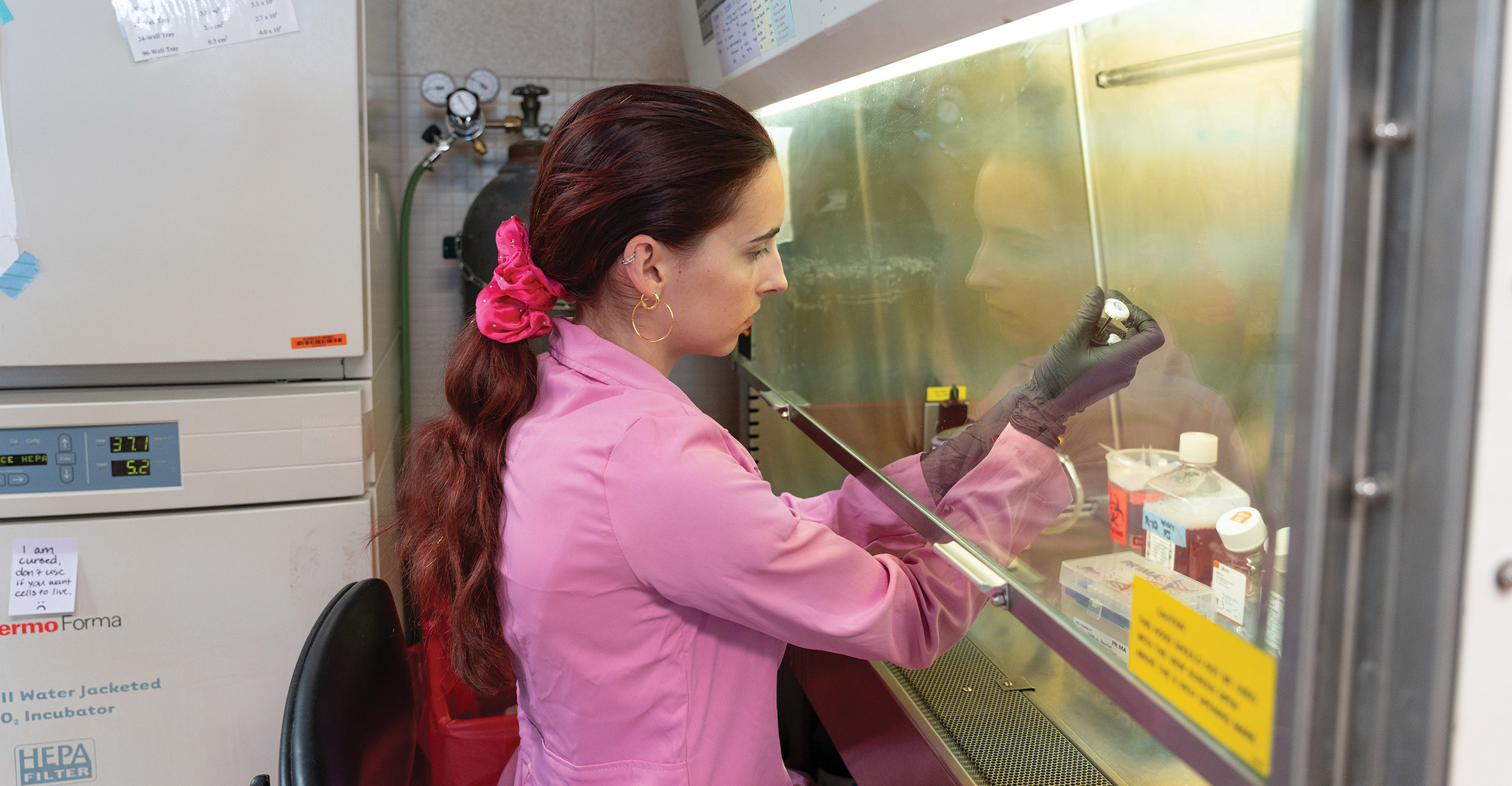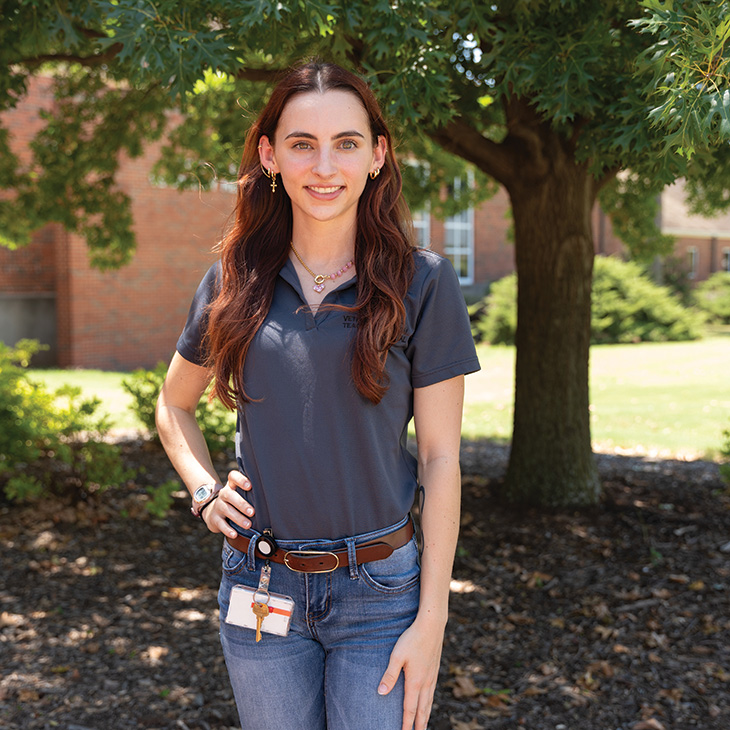
From adversity to impact: Johnson's journey to veterinary research
Thursday, January 2, 2025
Media Contact: Taylor Bacon | Public Relations and Marketing Manager | 405-744-6728 | cvmcommunications@okstate.edu
Paige Johnson’s life completely changed about two days after her high school graduation when she had a stroke, which then led to a seizure.
She woke up one day and had no remembrance of who or where she was.
“I was just a normal high school girl on birth control but happened to be the 1 in 5 million that has a sensitivity to it,” she said.
Johnson was taken in a medevac helicopter to Arkansas Children’s Hospital in Little Rock, where the doctors began lab work and blood clotting tests. After a large blood clot was found in her brain, she was sedated to dissolve the clot.
“After five days, the blood clot had shrunk enough, so I was able to go home, but a representative approached me and asked if she could enroll me in a clinical trial,” Johnson said.
She began the clinical trial, which sparked her interest in research.
“It hit me in that moment that without pharmaceutical work and clinical trials, I would have died in the hospital at 17,” Johnson said.
Johnson’s path to research has been a testament to resilience and determination. The challenges she has faced have shaped her perspective on the importance of research.
“My story is very generic all the way from K-12,” Johnson said. “I was that kid who always wanted to be a vet.”
Fast forward a few years when she earned a prestigious honor.
The Foundation for Food and Agricultural Research annually selects 15 exceptional students from across the globe for its Veterinary Student Research Fellowship.
"It was just that life-changing event that you go through at some point in your life where all of a sudden your whole path and interests change. Everybody has some adverse event in their life, but my goal is to not let that stop me from doing what I want to do."
Johnson, an Oklahoma State University College of Veterinary Medicine second-year student, was selected for this opportunity. Johnson’s journey into research is both inspiring and exemplary, making this award a well-deserved recognition of her dedication and hard work.
“I don’t know if I can describe how much it means to me,” Johnson said. “This field is special to me, and the work I do means a lot to me personally, so having support for the work we do from an organization like FFAR is truly incredible.”
The fellowship offers students the chance to advance research aimed at enhancing global food security, sustainable animal production and environmental sustainability. Each selected student receives a $10,000 scholarship to support their research.
“Paige is uniquely gifted with the ability to understand research questions and perform experiments with high accuracy,” said Dr. Rudra Channappanavar, Johnson’s principal investigator. “Paige played a crucial role in our recent study that identified a novel sensor of a SARS-CoV-2 membrane protein.”
The project’s goal was to explore zoonosis and reverse zoonosis of severe acute respiratory syndrome coronavirus 2 in farm animal species.
“We want to see whether our animals like goats, sheep, cattle and pigs are susceptible to infection with SARS-CoV-2 through host mechanisms, and if they are, whether they can act as a viral reservoir to infect humans,” Johnson said.
Johnson’s research on SARS-CoV-2 focuses on safeguarding the health of both humans and farm animals. Her work aims to prevent the spread of the virus and minimize its impact on livestock populations.
“The impact of SARS-CoV-2 is still being felt even after the pandemic as new strains mutate, making them capable of evading the immune system’s defenses even after vaccination,” Johnson said. “If these mutations can lead to infection in our farm animals, we need to know for both their well-being and our own.”

Before Johnson faced such traumatic health issues, she was only thinking about a career in veterinary medicine.
“It was just that life-changing event that you go through at some point in your life where all of a sudden your whole path and interests change,” Johnson said. “Everybody has some adverse event in their life, but my goal is to not let that stop me from doing what I want to do.”
While in veterinary school, Johnson joined the Summer Research Training Program, which allowed her to begin research within the veterinary field.
“Because of COVID, I didn’t get to do research through undergrad, so SRTP was really my first time,” Johnson said. “I was scared at first, but it was great and within a few weeks, I was already talking to my mentor about how I think research is for me.”
Johnson is on an ambitious path to earn both a DVM and a Ph.D., with the potential to pursue a residency program afterward. Her ultimate goal is to become a faculty member at a veterinary school.
“I think mentoring the next generation is a gift that shouldn’t be taken for granted, and I would love to be there to guide them through their journey the same way I have been guided through mine by so many brilliant mentors,” Johnson said. “My principal investigator has really made a huge difference in my life and my career through guiding and mentoring me, and I want to be able to be that for others in the future.”
Johnson’s commitment to research, particularly in understanding SARS-CoV-2’s effects on livestock, highlights her dedication to both animal and public health. With her passion and purpose, she is not only shaping her own future but also paving the way for meaningful advancements in veterinary medicine.
“Mentoring is critical for developing skills, transferring knowledge, guiding career paths, boosting confidence and promoting innovation,” Channappanavar said. “Paige’s exceptional research skills, dedication to research, and collaborative spirit make her a valuable asset to the field of veterinary medicine.”
